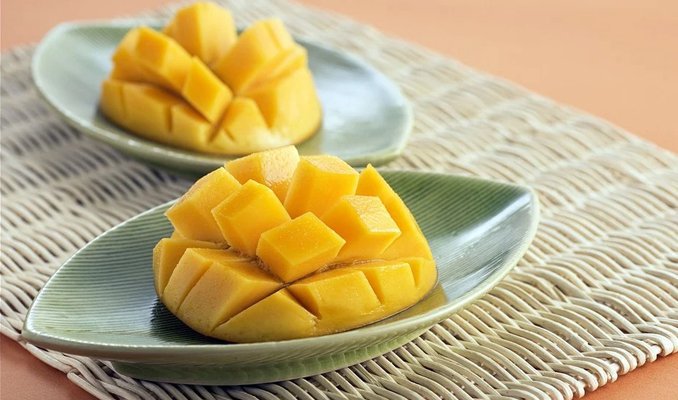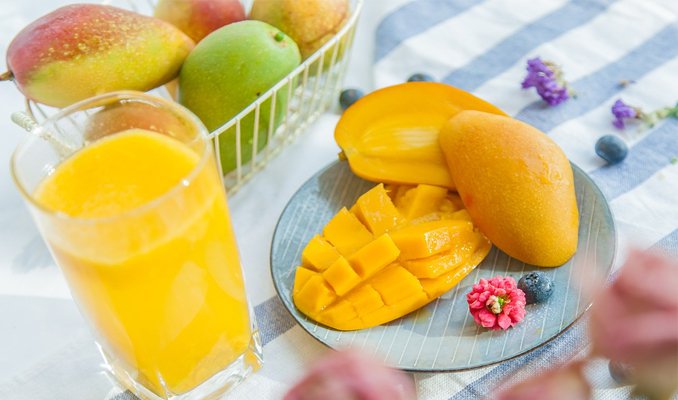Who doesn’t love mangoes? These tropical fruits are known for their sweet flavor and packed with vitamins and minerals. Mangoes are great for eating fresh, make health drinks, desserts, and dipping sauces. While they are versatile, mangoes tend to go bad quickly once they are ripe. Therefore, most will wonder how long mangoes will last and how to keep them fresh longer.
So how long do mangoes last? At room temperature, ripe mango will last 2-5 days, while unripe mango will last for about 1 week. In the fridge, ripe mango will last for about 5-7 days, while unripe mango will last up to 2 weeks. Freezing mango in the freezer will keep them fresh for 10-12 months.
Above is just an estimated time of how long the mango should last. There are other factors that could affect their shelf life. Some of them are storage temperature, where it’s stored, and when it was harvested.
In this short guide, we’ll go through the shelf life, where to store mangoes, how to tell when they become bad, and ways to keep them fresh longer. If that’s the information you’re looking for, keep reading.
Mangoes Shelf Life
| Room Temperature | Refrigerator | Freezer | |
|---|---|---|---|
| Whole (unriped) last | 7 Days | 14 Days | 10-12 Months |
| Whole (riped) last | 2-5 Days | 5-7 Days | 10-12 Months |
| Cut or Sliced (riped) last | 1-2 Hours | 5-7 Days | 10-12 Months |
| Puree last | Not Recommended | Not Recommended | 12 Months |
How Long Do Mangoes Last?
Riped Mangoes
Riped mangoes stored at room temperature will last 2 to 5 days. This estimate is at normal room temperature. If the room is hot, expect the riped mangoes to go bad sooner.
In the fridge, riped mangoes will last for 5 to 7 days. The cool temperature of the fridge will slow down the ripening process so it’ll last longer. If you store them in an airtight container or a sealable plastic bag, they could last an extra couple of days in the fridge.
Unriped Mangoes
For unripe mangoes, they will last up to a week at room temperature. Avoid leaving them where it’s in direct sunlight. If you do, the mango will go bad before it can ripen completely.
If you need them to ripen quickly, put the mangoes into a paper brown bag along with an apple or banana. These fruits will help ripen the mangoes quicker, usually within a day.
In the fridge, unripe mangoes will stay fresh up to 2 weeks. If it’s stored in an airtight container, it could last an extra week or so.
However, you should never leave unripe mangoes in the fridge for too long. The cool temperature just slows down the process of ripening but does not prevent the fruit from ripening. The longer it stays in the fridge, it will ripen to the point where the fruit will be very sour when you eat it.
Dried Mangoes
Dried mangoes will last for about a year at room temperature. These types of mangoes can actually last much longer if the package was never opened and stored properly. The best place to store them is in the pantry where it’s cool and dark.
In the fridge, dried mangoes can be stored there as well. Shelf life for dried mangoes stored in the fridge will be about 1 year. If the package has been opened, it will last about 6 months. After that, the dried mangoes are still safe to eat, but the quality of the fruit will decrease.
Frozen Mangoes
Mangoes stored in the freezer will stay fresh for about 12 months. They can actually last much longer than that if the temperature is left undisturbed at 0°F or -17°C. Unfortunately, in most households, that isn’t possible as the freezer needs to be open and close frequently.
Whole mangoes tend to stay fresh the longest as the thick rind does a good job of protecting the flesh.
Sliced and cut mangoes will last for about 7-8 months. They can stay fresh longer if it’s stored properly in an airtight container.
Mango puree will last the longest in the freezer. The puree can last longer than a year if it’s stored in an airtight container. If the container is left untouched, it can stay fresh for up to 2 years. This is possible since the flesh of the mango is
Can Mangoes Go Bad?
Like every other fruit out there, mangoes do go bad. These tropical fruits are high in sugar content. Fruits that have a lot of sugar content tend to go bad quickly. Therefore, after becoming riped, they will start to go bad quickly.
Temperature is the biggest factor that causes mangoes to go bad. The hotter the temperature is, the faster that will ripen and starts to spoil.
Cooler temperature, on the other hand, will slow down the ripening of the fruit, which will prevent the mangoes from going bad.
As the mango starts to go bad, there is still time to eat or use them before they completely spoil. Usually, when it starts showing dark spots, most people will store them in the fridge to extend their shelf life. If not, the mango fruit will spoil within a couple of days. If it’s left in a hot room, expect it to go bad in a day.
How To Tell If Mangoes Is Bad?
Like other fruits, when mangoes go bad, there will be signs to look for. Mangoes slowly decrease in quality so you will have time to eat or use them before they are completely spoiled. Below are the signs to look for when they go bad:
Colors – When mango goes bad, the colors will usually be brown to black. These colors mean the flesh inside has gone bad and causing the rind to darken. If you see these colors, you may be able to eat the mango if it’s only on part of the mango. However, if the dark colors are covering more than 80% of the mango, it’s best to throw them out.
Soft spots – Mangoes that are bad will have soft spots all over it. This is the flesh of the mango spoiling which causes it to be soft. Most of the time, if there are only a couple of soft spots here and there, you can eat the mango. Simply cut the soft area out and eat the rest. However, if the mango has soft spots all over it, you should throw it out.
Pests – Since mangoes are very sweet when they ripen, the fruit tends to attract flies and other pests. If you’ve noticed the skin of the mango has cracks, peel it away and look closely between the flesh. You may see maggots wiggling in there. Flies won’t eat the mango, but they will lay eggs in there so when it hatch, the maggots will consume it. If you see maggots, it’s best to throw away the entire fruit.
How to Store Mangoes?
Unripe mangoes should be stored at room temperature until they are ripe. If you want the mangoes to ripen quickly, simply put the mango into a brown paper bag along with an apple or banana. These fruits produce ethylene which causes the mango to ripen quickly.
Mangoes that are unripe can be stored in the fridge as well. However, it’s not recommended to do so as they will become sour. Some people like the flavor of sour mango and if that’s the case, the fridge is the place to store them.
For riped mangoes, they should always be stored in the fridge to preserve the freshness. The cool temperature of the fridge will slow down the ripening of the fruit. The fruit will still continue to ripe, but at a slower pace.
In the fridge, mangoes should always be stored in an airtight container or a sealable plastic bag. Storing them in either a container or plastic bag will prevent them from ripening prematurely due to other fruits and vegetables stored in there. Secondly, the less air that’s in the bag, the slower the ripening process it will be.
If you’re going to eat or use the riped mangoes within a day or so, leaving them at room temperature is fine. When storing them at room temperature, make sure it’s not extremely hot or the mango will not last longer than a day.
Also, be sure to put the riped mangoes into a basket and cover them with a paper towel. This will prevent flies from laying eggs in the mango.
Can You Freeze Mangoes?
Mango fruit can be frozen and they are one of those fruits that freeze very well. This is due to their high content of moisture and their thick rind which helps keeps the moisture inside. The fruit can be frozen as whole fruit, sliced, or puree.
However, if you are planning to eat them fresh, freezing the mango whole or sliced isn’t recommended. The problem starts when the fruit thaw. As it thaws, the mango will become mushy and watery.
Therefore, frozen mango is great for making smoothies, fruit drinks, desserts, and even dipping sauces.
How To Keep Mangoes Fresh Longer
Selecting Mangoes
When selecting mangoes at the grocery store, always look for the best quality ones. Quality mangoes will have nice smooth skin with not a lot of blemishes.
When selecting the ripeness of the mango, choose them depending on when you’ll be eating or using them. If the mangoes are going to eat within a day or so, choose the riped one. It should be yellowish and soft when you squeeze it.
For mangoes that are going to be stored for a week or more, choose the one that is green in color with no tears or cut in the rind. Tears and cuts, even small ones, will prematurely cause the mangoes to go bad quickly.
Handling Mangoes
Riped mangoes should be handled with care when transporting them from the store to storing them in your home. Mangoes that are riped will easily bruise which will cause them to go spoil quickly.
Therefore, when transporting riped mangoes from the grocery stores, always carry them separately in a bag or place them on top of other produce.
At home, whether it’s stored at room temperature or in the fridge, try not to bunch them together. The pressure from the mangoes will eventually cause the skin of the fruit to open. Instead, store each mango separately from each other.
Related Questions
Is it OK to eat mango with black spots?
The black spots on the mango mean it’s starting to rot. However, it’s safe to eat the fruit if there are only a few black spots on them. Depending on how much it has rotted, the dark spots can appear deeper into the fruit. If so, simply cut the dark spots out and eat the rest.
If there are black spots all over the mango fruit, it’s best to just throw it out. It will be slimy and not very good tasting.



